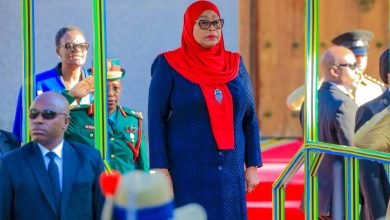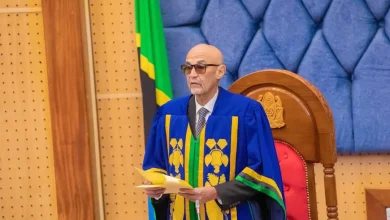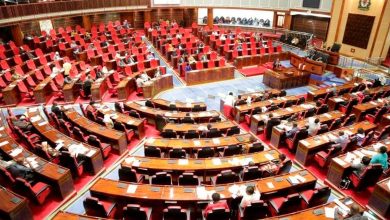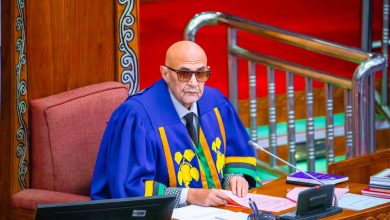KNOW YOUR CANDIDATES: Mr Costa Kibonde, Makini Party Presidential Aspirant

DAR ES SALAAM: TANZANIA’S political landscape is witnessing the rise of a leader whose life story mirrors everyday experiences of its citizens. Mr Costa Kibonde, the presidential flagbearer for Chama cha Makini, brings a perspective shaped, not in distant corridors of power, but on the streets, markets and communities where ordinary Tanzanians live and work.
Hailing from Mbeya, Mr Kibonde’s journey from the modest neighbourhoods of Majengo and Mbalizi to the national stage is defined by resilience, determination and an enduring commitment to public service.
With nearly thirty years of experience in politics, business and community engagement, he offers a vision for Tanzania that focuses on universal education, modernised agriculture, accessible healthcare, youth empowerment and sustainable national development.
For Kibonde, leadership is not just about office—it is about transforming challenges into opportunities and turning aspirations into measurable progress for all Tanzanians.
He was born in 1978 at Meta Hospital in Mbeya, as a twin alongside his brother, Victor Kibonde.
He grew up in the vibrant community of Majengo, along Malawi Road, Mbeya town. His formative years in Mbeya laid the foundation for a life devoted to public service, entrepreneurship and civic engagement.
He began his formal education in 1987 at Majengo Primary School in Mbeya, attending classes from the first through the sixth grade.
In 1991, his family relocated to Mbalizi in Mbeya Rural District, where he continued his primary education at Mbalizi II Primary School, completing the sixth and seventh grades by 1993. Demonstrating an early dedication to academic achievement, he proceeded to Mbalizi Secondary School, graduating in 1998.
Committed to acquiring practical skills alongside academic knowledge, Mr Kibonde enrolled at Mbalizi Technical College, where he pursued automobile mechanics for two years, equipping himself with technical expertise that would later support his entrepreneurial ventures. Following his technical studies, he embarked on a diverse career path, involving both small-scale businesses and political activism.
He initially engaged in local entrepreneurship as a street vendor, gaining firsthand experience in the challenges and opportunities of small businesses in Tanzania.
Eventually, he moved to Dar es Salaam, where he expanded his business interests while immersing himself more deeply in political activities. Mr Kibonde is also a family man.
He is married to Zena Nasolo Mzegula, and together they are blessed with three children: Jenny Costa Kibonde, Jimmy Costa Kibonde and Hilda Costa Kibonde.
Mr Kibonde’s political journey spans nearly three decades, beginning in 1995 when, at the age of 17, he joined the multi-party movement in Tanzania.
He became an active member of the NCCR– Mageuzi party under the national leadership of Augustine Lyatonga Mrema.
Demonstrating early leadership potential, he was elected as the first Chairman of the Mapelele Branch in Mbalizi, a position he held from 1995 to 1998.
His tenure was marked by grassroots engagement, local problem-solving and a focus on mobilising youth and communities for active political participation.
In 1998, following his relocation to Dar es Salaam, Mr Kibonde continued his political activism in the Sinza D neighbourhood, remaining committed to public service despite initially holding no formal leadership title.
Political turbulence within NCCR–Mageuzi between the national secretary-general and the party chairman led to significant realignments.
In 1999, when Mrema left NCCR–Mageuzi to join the Tanzania Labour Party (TLP), Kibonde, a loyal supporter, followed, marking a key transition in his political career.
ALSO READ: TLS presidential aspirants clash in debate
Through TLP, Kibonde’s leadership skills flourished. He was elected Chairman of Sinza Ward and later contested for the Ubungo constituency council seat, successfully entering local governance.
Recognised for his dedication and organisational capabilities, he was appointed as the Regional Security Chief for Dar es Salaam and later promoted to National Security Chief within TLP, serving as a close aide to Mrema.
Despite political setbacks after the 2005 General Election, which led to reduced party funding and organisational challenges, he remained resilient.
He ventured into entrepreneurial endeavours, opening shops selling motorcycle and Bajaj spare parts, demonstrating his adaptability and tenacity.
In 2009, when Makini party sought seasoned political leaders, Mr Kibonde answered the call and was appointed as the National Secretary for Ideology and Publicity.
Over the next several years, he held key leadership positions, including full Secretary for Publicity (2010–2015) and Deputy Secretary-General for Mainland Tanzania (2015–2020).
He also contested for the Ubungo parliamentary seat in 2015, further solidifying his credentials as a committed and experienced political leader.
Mr Kibonde’s journey has not been without challenges. In 2020, during his ambition to contest the nanursery to university for all Tanzanians.
The initiative aims to ensure equitable access to quality education, strengthening the country’s human capital and enabling youth to become self-reliant and entrepreneurial.
The party plans to improve school infrastructure, enhance teacher training, provide adequate teaching materials and promote technical and vocational education to prepare students for gainful employment or entrepreneurship.
University and higher education students will receive a monthly subsistence allowance as a grant, alleviating financial burdens and fostering academic focus.
On agriculture, with approximately 60 per cent of Tanzanians dependent on the sector, Kibonde aims to modernise it to improve productivity and livelihoods.
The party proposes allocating five acres of land to every youth aged 21–35, enabling them to access credit facilities and adopt modern farming techniques.
Farmers will benefit from guaranteed domestic and international markets, technical training and access to inputs such as seeds, fertilisers and pesticides. Strategic infrastructure improvements, including roads, railways and ports, will facilitate crop transport and global market access.
These initiatives will ensure sustainable agricultural growth and increased household incomes.
On healthcare, Mr Kibonde is committed to establishing a universal health insurance programme, Makini Care, providing coverage for every Tanzanian from birth.
The plan includes constructing modern health centres in every ward, upgrading dispensaries across urban and rural areas and equipping regional hospitals with advanced diagnostic tools, including MRI, CT scan and dialysis machines.
Efforts will focus on expanding the workforce of doctors, nurses and specialists, ensuring high-quality maternal and child healthcare and maintaining consistent standards.
Recognising youth as the engine of national growth, Kibonde’s platform includes distributing one million motorcycles to youth across Mainland Tanzania and Zanzibar, coupled with entrepreneurship, financial management and road safety training.
Chama cha Makini aims to create one million jobs annually, particularly targeting youth and women, through the expansion of industries, agricultural projects and service enterprises, fostering sustainable employment opportunities.
On infrastructure and national development, to support economic growth, Kibonde emphasises modernising transportation networks.
All major interdistrict roads will be paved, constructed and maintained to high standards. Government-private sector partnerships will be leveraged to expand infrastructure investment, enhancing the movement of goods, people and essential services, ultimately promoting economic competitiveness and national integration.
Mr Kibonde asserts that the ambitious programmes of his party will be sustainably funded through government revenue streams, including taxation and natural resources such as forests, rivers, lakes and the coastal maritime domain.
The objective is to provide high-quality education, healthcare and public services without financial barriers, ensuring inclusive development for all Tanzanians.
Mr Kibonde’s political philosophy is grounded in service, integrity and accountability. He believes that effective leadership is measured by tangible improvements in citizens’ lives.
Throughout his political career, he has consistently championed grassroots engagement, transparency and empowerment of marginalised communities.
His leadership style reflects resilience, vision and an unwavering commitment to national progress. Mr Kibonde represents a blend of political experience, entrepreneurial initiative and a visionary approach to national development.
From his early days in Mbeya to his extensive political career spanning multiple parties and leadership roles, he has demonstrated commitment, perseverance and a deep understanding of Tanzanian socio-economic realities.
As the presidential flagbearer of Chama cha Makini, Kibonde presents a transformative agenda that prioritises universal education, modernised agriculture, accessible healthcare, youth empowerment, employment creation and infrastructure development.
His vision is grounded in the principle that every Tanzanian, regardless of background, should have the opportunity to thrive and contribute to the nation’s growth.
With a life dedicated to service, a career marked by resilience and a manifesto rooted in practical solutions, he offers Tanzanians a leadership alternative focused on equity, progress and sustainable development.
His commitment to transforming education, agriculture, healthcare and employment reflects a holistic understanding of national challenges and a comprehensive plan to address them.
Under his leadership, the party envisions a Tanzania where every child can access quality education, every farmer can thrive in modern agriculture, every citizen can receive timely healthcare and every youth can find meaningful employment.
He stands as a symbol of dedication, hope and inclusive progress, ready to lead Tanzania into a future of opportunity, prosperity and social justice.





